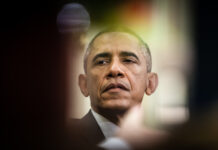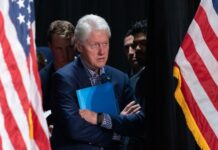
In a move that has sparked widespread debate about free speech and press freedom, European Union officials have called for a travel ban against American journalist Tucker Carlson. This unprecedented step comes in the wake of Carlson’s recent trip to Moscow, where he conducted an interview with Russian President Vladimir Putin.
Carlson’s decision to interview Putin has been met with fierce criticism from some EU politicians, who argue that his actions serve as propaganda for the Russian leader. Former Belgian Prime Minister and current member of the European Parliament Guy Verhofstadt has been particularly vocal, labeling Carlson as a “mouthpiece” for Putin and suggesting that the EU should consider banning him from entering its member states.
Tucker Carlson is taking real risks. He is making a real sacrifice… He is putting his life, and I’m not exaggerating, in danger! It’s reported that the European Union is sanctioning a travel ban on Tucker for doing what American journalists are required to do. pic.twitter.com/mV8HMnWNLN
— Jason Whitlock (@WhitlockJason) February 7, 2024
Supporters of free speech have rallied to Carlson’s defense, emphasizing the importance of allowing journalists to seek out and disseminate a range of perspectives, even those that may be unpopular or controversial. Infowars founder Alex Jones, for example, has publicly denounced the EU’s actions as an attack on free speech, urging unity against such censorship attempts.
The content of Carlson’s interview with Putin has yet to be disclosed, but given Carlson’s history of challenging prevailing narratives on Russian policy, many expect it to offer a viewpoint sympathetic to Moscow. Critics are concerned that this could undermine efforts to hold Russia accountable for its actions on the international stage.
JUST IN: The European Union is considering imposing a travel ban against Tucker Carlson for interviewing Putin.
EU lawmakers are now furious that a journalist flew to Russia to do journalism.
They now want to slap Tucker with sanctions for “assisting” Putin.
“Putin is a war… pic.twitter.com/jUjEody4vp
— Collin Rugg (@CollinRugg) February 7, 2024
This is not the first time Carlson has faced backlash for his reporting. In 2021, he claimed that the National Security Agency (NSA) was spying on him and leaking his emails to the media in an attempt to get his show canceled. These allegations added to the growing mistrust between government agencies and the press.
The call for a travel ban has also reignited discussions about the role of journalism in modern geopolitics. Some argue that engaging with figures like Putin is essential for understanding global conflicts, while others contend that it risks legitimizing leaders accused of serious crimes.
Carlson himself has stated that the purpose of his interview is not to endorse Putin but to provide Americans with a clearer understanding of his motives and objectives. He believes that informed citizens are better equipped to make their own judgments about international affairs.
As tensions continue to rise, the situation underscores the delicate balance between national security interests and the principles of free expression. The proposed travel ban on Tucker Carlson will likely remain a contentious issue as the world grapples with the complexities of diplomacy, journalism, and the right to information.









